Beyond Perceived Limits
Posted on Jan. 14, 2020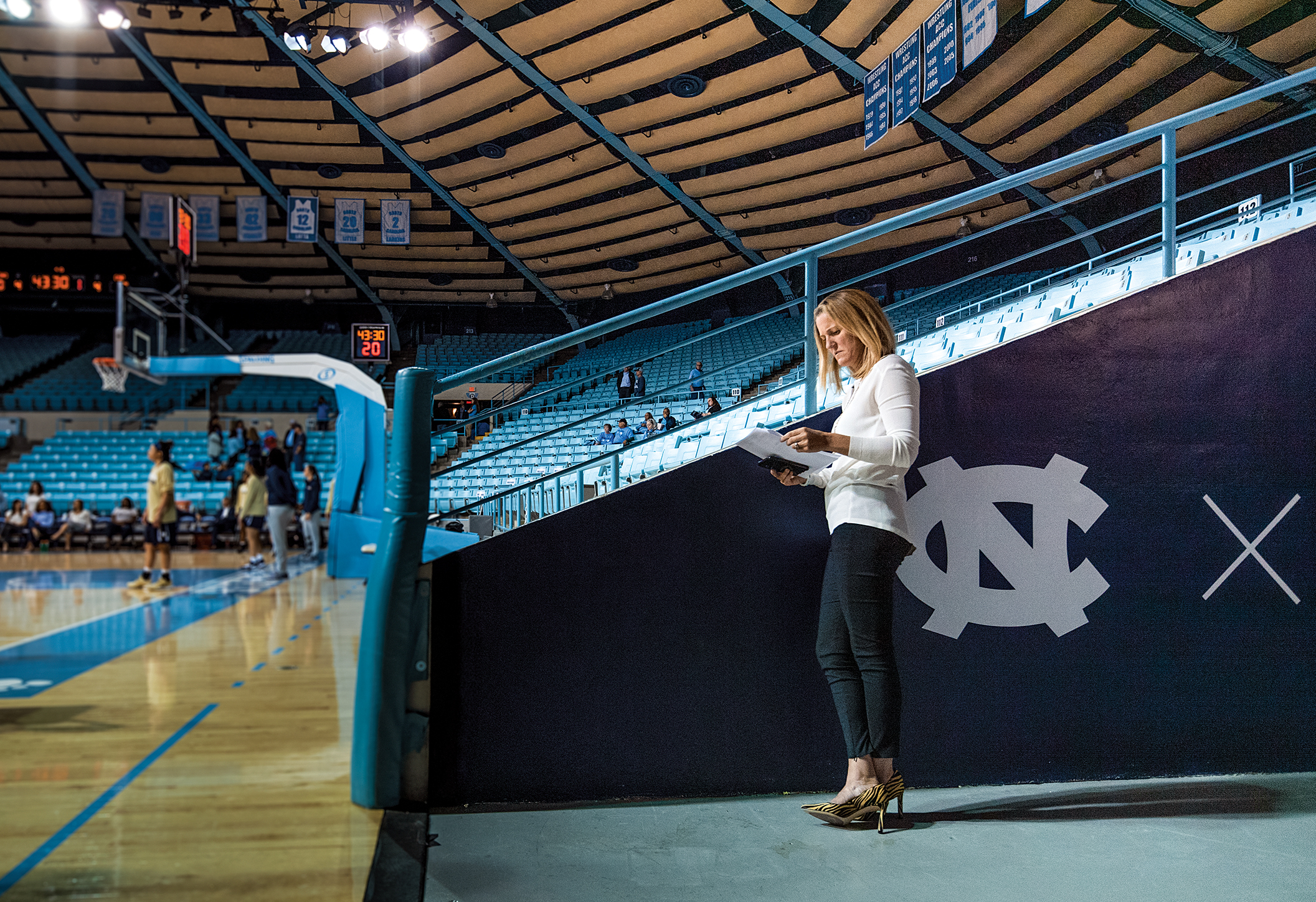
Courtney Banghart frequently dives into the deeper waters of being a college coach — the place where wins matter, but growth matters more. (Grant Halverson ’93)
The only thing she’s ever feared is regret; the only thing she’s ever done is win. Courtney Banghart brings a holistic approach to an ailing basketball program.
by Beth McNichol ’95
A long time ago, a kid told her dad that the soccer cleats that had carried her fleetly and assuredly across the fields of Amherst, N.H., had become exhausted.
“You need new cleats?” asked Jim Banghart, a patient, disciplined electrical engineer. Banghart, who lost his own father when he was a teenager, had gained a habit of resourcefulness. He wrapped a few strips of tape around the shoes and handed them back to his daughter.
“They’re fine,” he said.
The daughter went on to win four state titles in soccer, become a high-school All-American and the all-time leader in career goals for the state of New Hampshire, a record that stood for 16 years. She stood across the net from posh kids with private coaches and won six state tennis titles with her tattered racket and two more state championships with the Souhegan High girls’ basketball team — credit her younger brother’s sneakers with an assist.
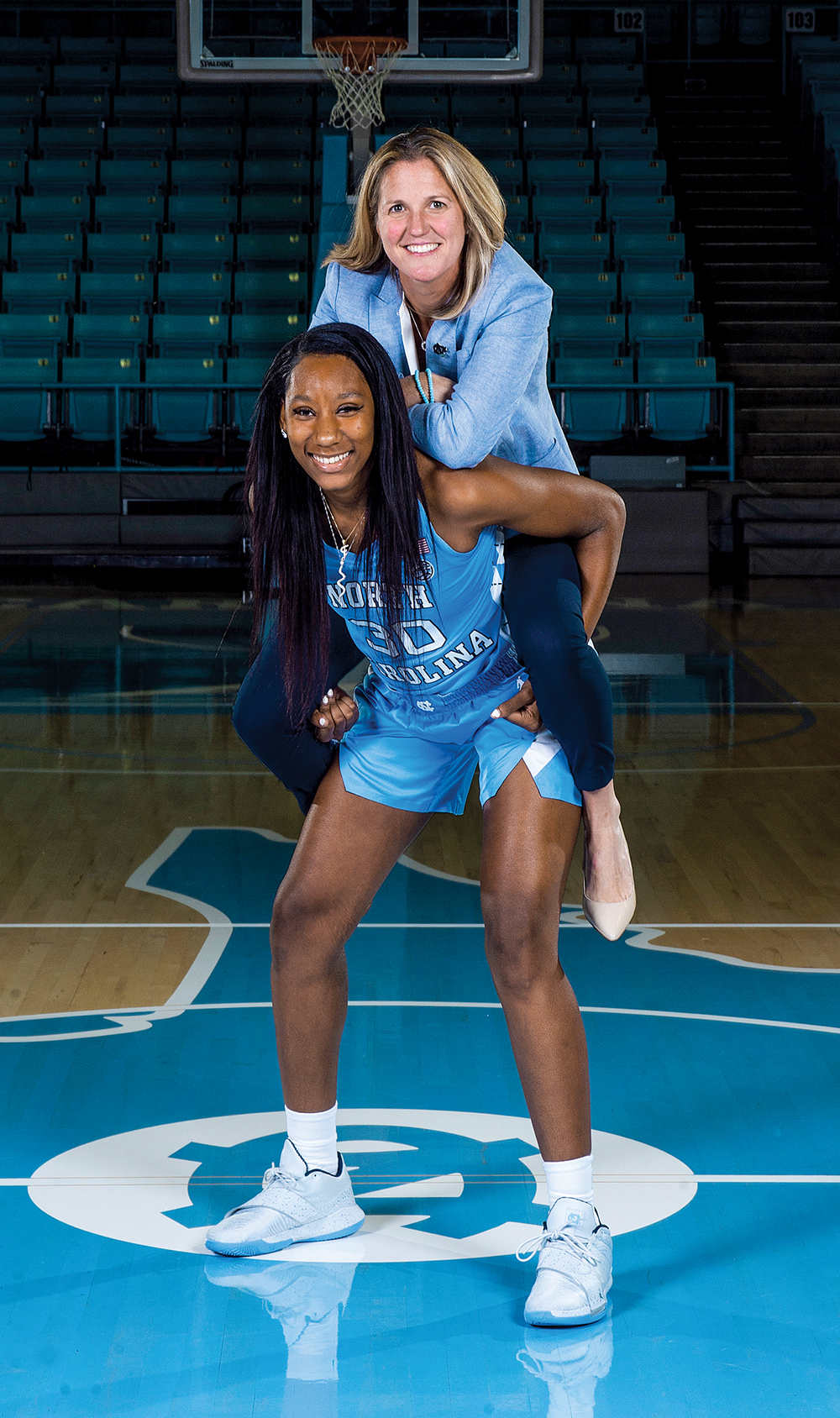
When she interviewed Anson Dorrance ’74 and other coaches for her master’s thesis on sports leadership, Banghart learned that coaching could be as deep and satisfying as she needed it to be.(Jeffrey A. Camrati ’19)
Courtney Banghart was highly recruited. Everyone in New Hampshire figured she would accept a soccer scholarship to a place like Notre Dame — which had just halted the nine-year NCAA championship winning streak of a team she idolized, The University of North Carolina.
But as a public school kid from New England, where you couldn’t swing a tennis racket without hitting an Ivy League-feeder boarding school, she made an unexpected choice.
“I’m going to Dartmouth with all the smart kids,” she said. “If it doesn’t work out well, I’ll just work a little harder, figure it out. I’ll figure it out.”
When the Dartmouth soccer coach who’d recruited her left for Stanford, Banghart saw an opportunity to try out for basketball — the sport that was her favorite, the sport that was her worst. She became the Ivy League career record-holder for three-point field goals and won the award for the nation’s top perimeter shooter in 1999. Not bad for a soccer player.
That fearless pivot to the hard court would change the direction of Banghart’s life. At age 29, the same week she defended her master’s thesis in writing and leadership at Dartmouth, she became a Division I head basketball coach. At 37, she led Princeton to an undefeated regular season, its fifth conference title and the second round of the NCAA Tournament. She was named the 2015 Naismith National Coach of the Year — the only Ivy coach, men’s or women’s, ever to receive the award. Fortune magazine put her on a list with the pope and Bill Gates as one of the world’s 50 greatest leaders and made her the keynote speaker at its luncheon.
“What do you do at Princeton?” asked the news anchor Katie Couric, who was seated at Banghart’s table.
“I coach basketball,” Banghart replied.
“All day?” Couric wisecracked.
Then the emcee handed the mic to the kid from Amherst.
“The best advice I ever received,” she began, “is that life is about two things: Who you are, and who you help.”
What is the value of an old pair of soccer cleats? And who has the power to decide? There’s only ever been one correct answer to each of those questions for Courtney Banghart.
As a public school kid from New England, where you couldn’t swing a tennis racket without hitting an Ivy League-feeder school, Courtney Banghart made an unexpected choice: “I’m going to Dartmouth with all the smart kids. If it doesn’t work out well, I’ll just work a little harder, figure it out.”
“What people really don’t know about Courtney,” said Michele DeJuliis, who has been married to Banghart for seven years, “is that she’s had to earn a lot in her life.”
Last spring, Banghart earned the job of a lifetime when she was named the first new Tar Heels women’s basketball coach in 33 years, replacing a coach and taking over a program whose shine had faded under the tarnish of scandal and disconnection. The role is tailor-made for Jim Banghart’s daughter: An opportunity to repair a beloved thing that has fallen out of favor, to patch its holes and mend its stitches — and then go out and win with it.
“I’m just a small-town kid from New Hampshire,” Banghart said. “I’ve got two Ivy League degrees, and I’m coaching in the Power 5. I’m just an underdog. But I know I do it the right way, and I’m driven to prove that at the highest level.”
The right way
Banghart’s coaching philosophy began to form even as she fought the very idea of it as a profession. Classmates were going into banking and law and medicine — the recognized vocations of an Ivy Leaguer; those did not interest her. But did coaching do justice to the hustle she’d put in to go from Souhegan High standout to Dartmouth College graduate?
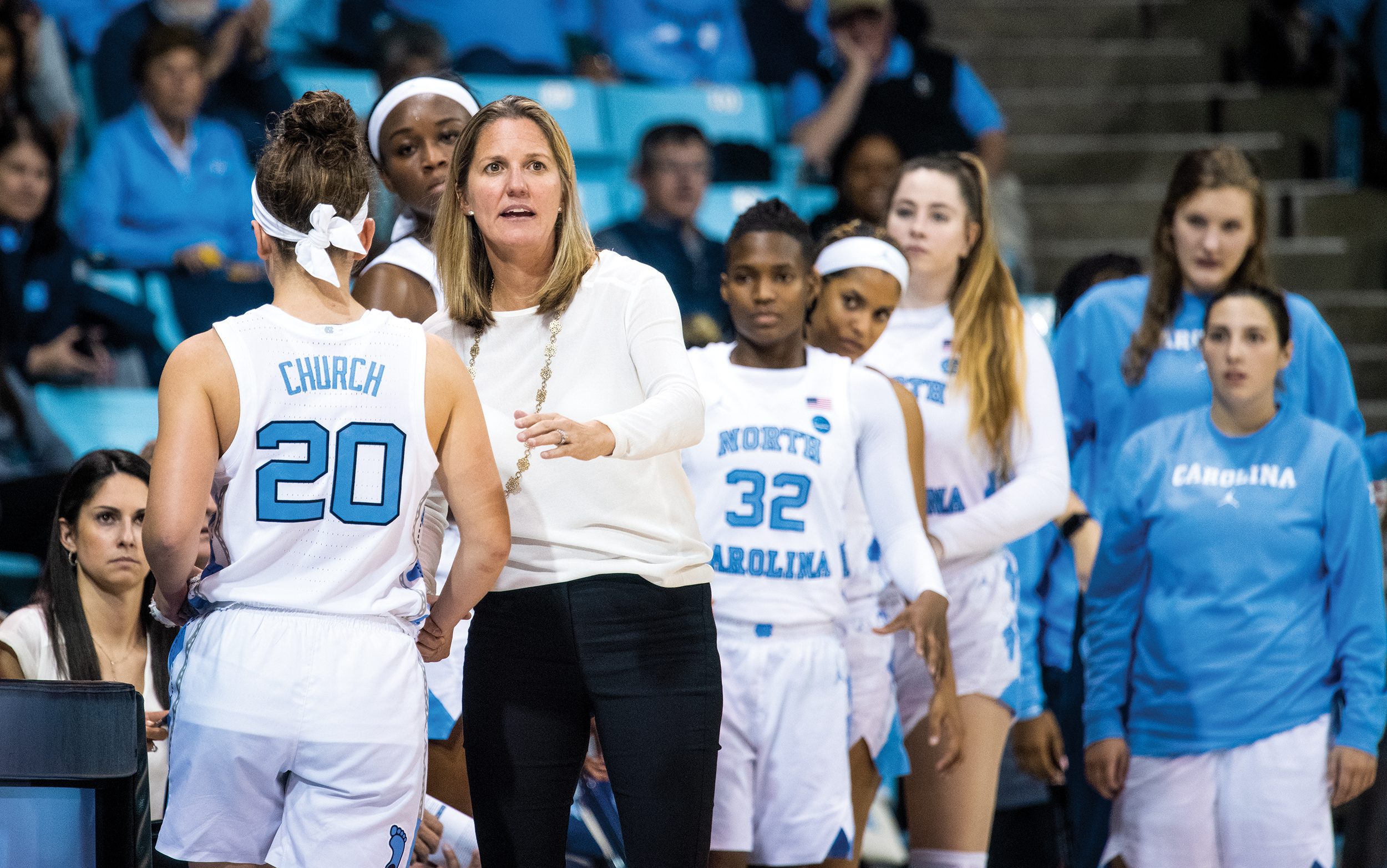
“What we do is hard,” says Banghart. “And what I’m asking them to do is show courage. And that’s going to be a process which is naked sometimes, and it’s alone sometimes. So, I think it’s a fascinating time to be a coach.”(Grant Halverson ’93)
When she interviewed Anson Dorrance ’74 and more than a dozen other college coaches for her master’s thesis on sports leadership — which she wrote while working as an assistant at her alma mater — Banghart learned that coaching could be as deep and satisfying as she needed it to be.
“What made the good ones good is they were just the best versions of themselves,” Banghart said. “I was like, ‘I can do that. I can be the best version of myself. I don’t have to coach your way or his way.’ ”
That realization freed Banghart, who earned her undergraduate degree in neuroscience, to put together a thoughtful experiment when she took over at Princeton in 2007: that you can coach and win without chasing your ego; that you can be completely student-focused and athlete-focused; and that you can “be about the process” instead of the results and still achieve the latter all the same.
The experiment unequivocally succeeded at Princeton, where the Tigers had been toiling below the midline of their own lackluster league for years. She sold recruits, many of whom could have played in higher profile conferences, on her vision to gain not only the Ivies’ respect but the nation’s notice.
Banghart wasn’t just looking for stars; she was looking for grit and growth mindsets. Sometimes, she got all three qualities.
Banghart met with sought-after guard Lauren Edwards in 2007 on her first home visit to a recruit; at 29, she had yet to coach a college basketball game. The day before, Stanford’s Hall of Fame coach Tara VanDerveer — who had two NCAA titles and an Olympic gold medal — had offered her pitch to the athlete.
When the soccer coach who’d recruited her left for Stanford, Banghart saw an opportunity to try out for basketball — the sport that was her favorite, the sport that was her worst. She became the Ivy League career record-holder for three-point field goals and won the award for the nation’s top perimeter shooter in 1999. Not bad for a soccer player.
Edwards chose Princeton. “Given [Banghart’s] lack of track record, it was a little bit of a leap of faith,” Edwards said with a laugh. “But to me, what she was coming to the table with was a much more exciting journey for a college basketball career. She positioned it as, ‘Let’s join arms and build something together.’ ”
Edwards’ trust helped lead other strong recruits to follow her to Princeton. Two years later, the Tigers made the NCAA Tournament for the first time in school history.
Banghart knew how to fix an elite teenage athlete’s sights on earning new successes, not simply transferring their old ones to college. After all, she’d done it herself.
“You think about kids who come in as freshmen,” said DeJuliis, a four-time lacrosse All-American at Penn State and founder and CEO of the Women’s Professional Lacrosse League, “and they’re like these lost souls sometimes. I mean, Blake Dietrick, for instance.”
Dietrick was headed to Princeton as a standout lacrosse player in 2011 when DeJuliis, who was a Tigers assistant lacrosse coach at the time, dropped her off at Banghart’s door during a campus tour.
DeJuliis knew that Banghart had glimpsed Dietrick’s relentless work ethic at a previous basketball camp and had been impressed.
“I get to Courtney’s office, and I say to Blake, ‘I guess this will be the last time I see you,’ ” said DeJuliis, who captained the 2009 U.S. team that won the Women’s Lacrosse World Cup. “Sure enough, Courtney offers her a spot on her team.”
Dietrick, now in the WNBA, went on to become an honorable mention AP All-American and the Ivy League Player of the Year, part of that 2015 Princeton team that went 31-1 despite having no high school All-Americans — and of course, as an Ivy League school, no athletic scholarships — while climbing to an unprecedented No. 13 in the country and the No. 8 seed in the NCAA Tournament.
During that remarkable year, Banghart never talked to the team about keeping its undefeated streak going, not because of some no-hitter inspired superstition, but because the result wasn’t the focus. It was the process. In team meetings, she’d acknowledge their accomplishments: “Yeah, people think we’re pretty good,” she’d say. “We are. That’s a fact. We’re good.”
“And then I right away would show film from the previous day’s practice and be like, ‘We got to get better, get better.’ We just stayed in the moment. We were never good enough and never too good.”
Banghart was so committed to her program’s principles that, when President Barack Obama in 2015 became the first sitting commander-in-chief to attend a women’s NCAA basketball game (his niece, Leslie Robinson, was a freshman for Princeton), Banghart strategically ignored his approach as he made his way behind the Tiger bench before the game. Her eyes were locked on her team at midcourt.
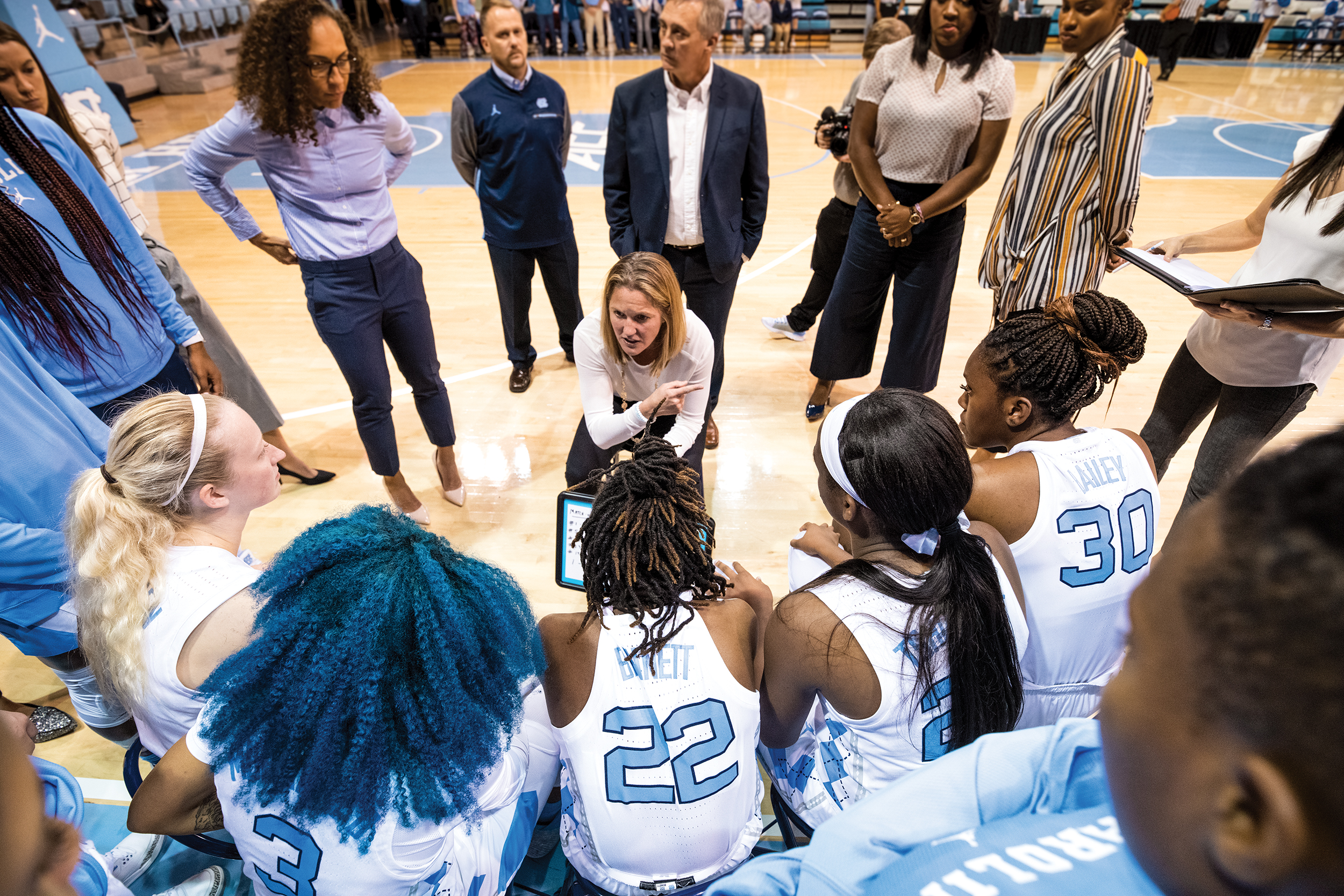
When President Barack Obama in 2015 became the first sitting commander-in-chief to attend a women’s NCAA basketball game, Banghart strategically ignored his approach as he made his way behind the Tiger bench before the game. Her eyes were locked on her team at midcourt. (Grant Halverson ’93)
“I didn’t want them to come running toward me and see me shaking hands with the president instead of focused on them,” she said. “I’ve still never met him. And I don’t regret it. I wasn’t there to meet the president. I was there to be with my team.”
The power of going for it
Conversations with Banghart often are master classes in emotional intelligence. On podcasts and in interviews, she frequently catches people off-guard by diving into the deeper waters of being a college coach — the place where wins matter, but growth matters more.
In January 2019, on a podcast called “What in God’s Name,” Banghart spoke about social media’s damaging effect on mental health. The insecurity that results each day when a young person’s curated news feed meets the real person in the mirror, Banghart said, poses specific challenges for college coaches.
“How far do you push them, how hard do you push them, how much do you tell it to them straight within the realities that they are living in? … I’m learning on the fly, by having very real conversations with people on our campus who study [mental health] … to make sure I’m meeting their needs — while not losing sight of: What we do is hard. And what I’m asking them to do is show courage. And that’s going to be a process which is naked sometimes, and it’s alone sometimes. So, I think it’s a fascinating time to be a coach.”
Banghart’s response audibly floors the podcast’s host.
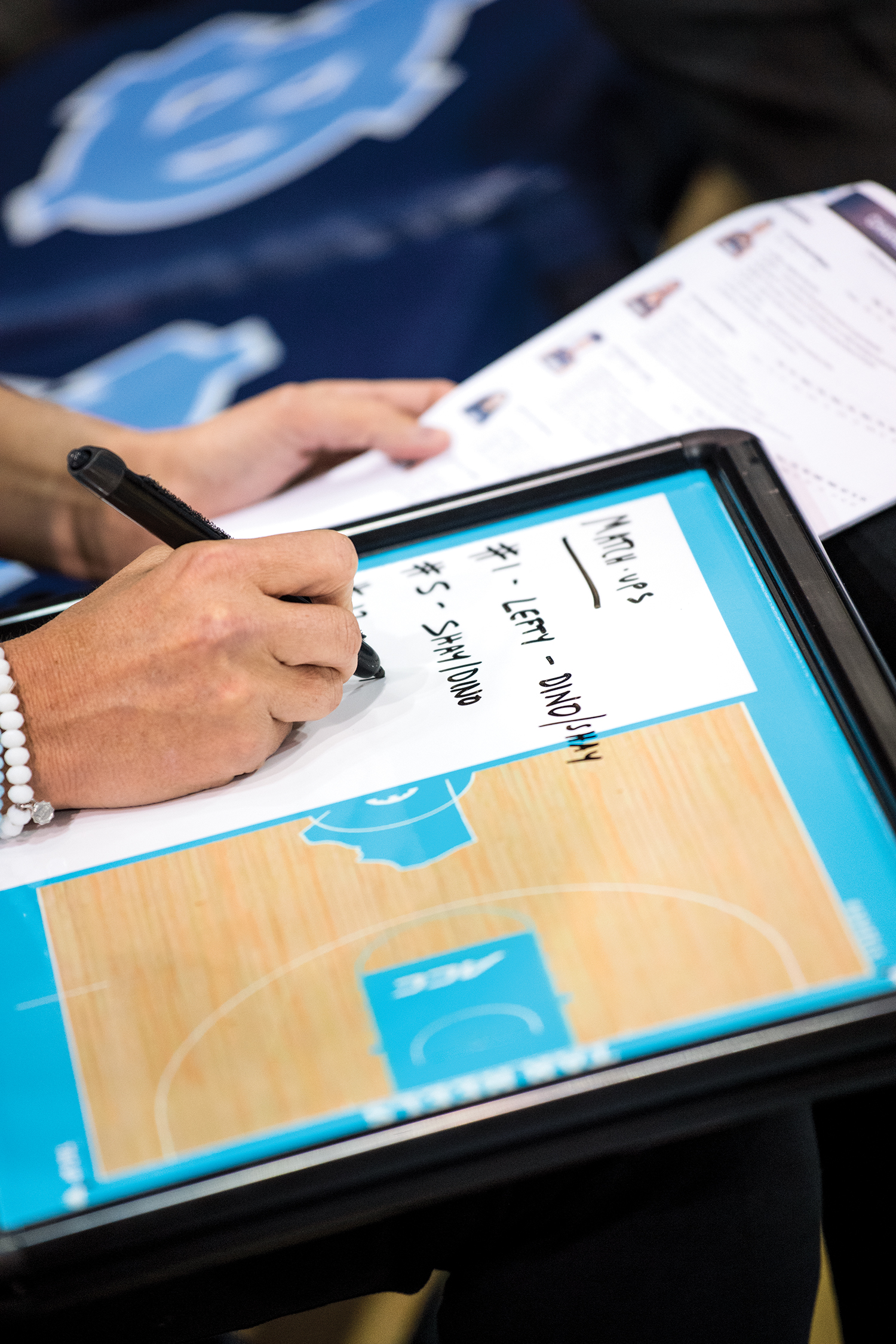
(Grant Halverson ’93)
“It’s a fascinating time,” Chris Owen says, “to be a coach who has your sensibilities.”
Those sensibilities will be crucial in Chapel Hill, where the women’s basketball team endured five years of disappointment, scandal and transfers — and, finally, the resignation in April 2019 of Sylvia Hatchell, its Hall of Fame coach who was accused of racial insensitivity and forcing players to compete while injured. The events left an exit wound that Banghart would have to treat.
At their initial meeting with their new coach, the Tar Heel women asked Banghart about her goals for the program.
“It doesn’t matter what mine are,” she told them. “What matters is what yours are.”
Banghart aimed to empower them; like a kid with worn-out cleats, they would get to decide their own worth. After three straight losing seasons in which it failed to make the NCAA Tournament, Carolina finished 18-15 last year and lost in the first round. Banghart called those games “hard to watch.” The inconsistent play, the tendency to shut down in difficult situations — none of that had to happen just because they’re college kids, she said. Under Banghart, each player will “be on their own progress” so the team can win together.
“You have to push people beyond their perceived limits,” Banghart said. “If you do that, it’s really uncomfortable to them. And yet, I am charged with creating a positive student-athlete experience. Those concepts are in complete opposition every minute of every day. But I hope that what I’ll impart to them is that the only thing you should be afraid of is regret. That’s it. You’ve got four years here. You have four years to be a teammate, four years to be a classmate, four years to be all of that. You will not regret engaging fully in this opportunity.”
For Banghart, taking over the UNC job was leading by example. Had she stayed at Princeton, she said, she might have coasted through to the Hall of Fame and even more entries in more record books.
“And then what?” she asked. “Those things are about only me, and they do not sustain me. I would have regretted that one institution got my entire collegiate coaching experience. Coming to UNC is a risk, but I’m not willing to have regrets in life. I like helping people understand the power of going for it.”
This wasn’t her first opportunity to go for it; Banghart’s name was mentioned whenever there was a Power 5 coaching vacancy in recent years — and, routinely, by admirers at schools where there wasn’t an opening. On Duke’s message board, dejected fans greeted the news of UNC’s hire with a dose of Pepto Bismol.
“I’ve turned down many jobs over the last five to 10 years,” said Banghart, who believes her sport needs for UNC to be good to gain more followers. “For me, coaching was never going to be about taking one job so I could get to another job. It’s either the job I want, or I’m not taking it. What I love about North Carolina is that it has a national brand that’s both academic and athletic. You want to go to school here, and you want me to coach you — I want both of those things to happen.”
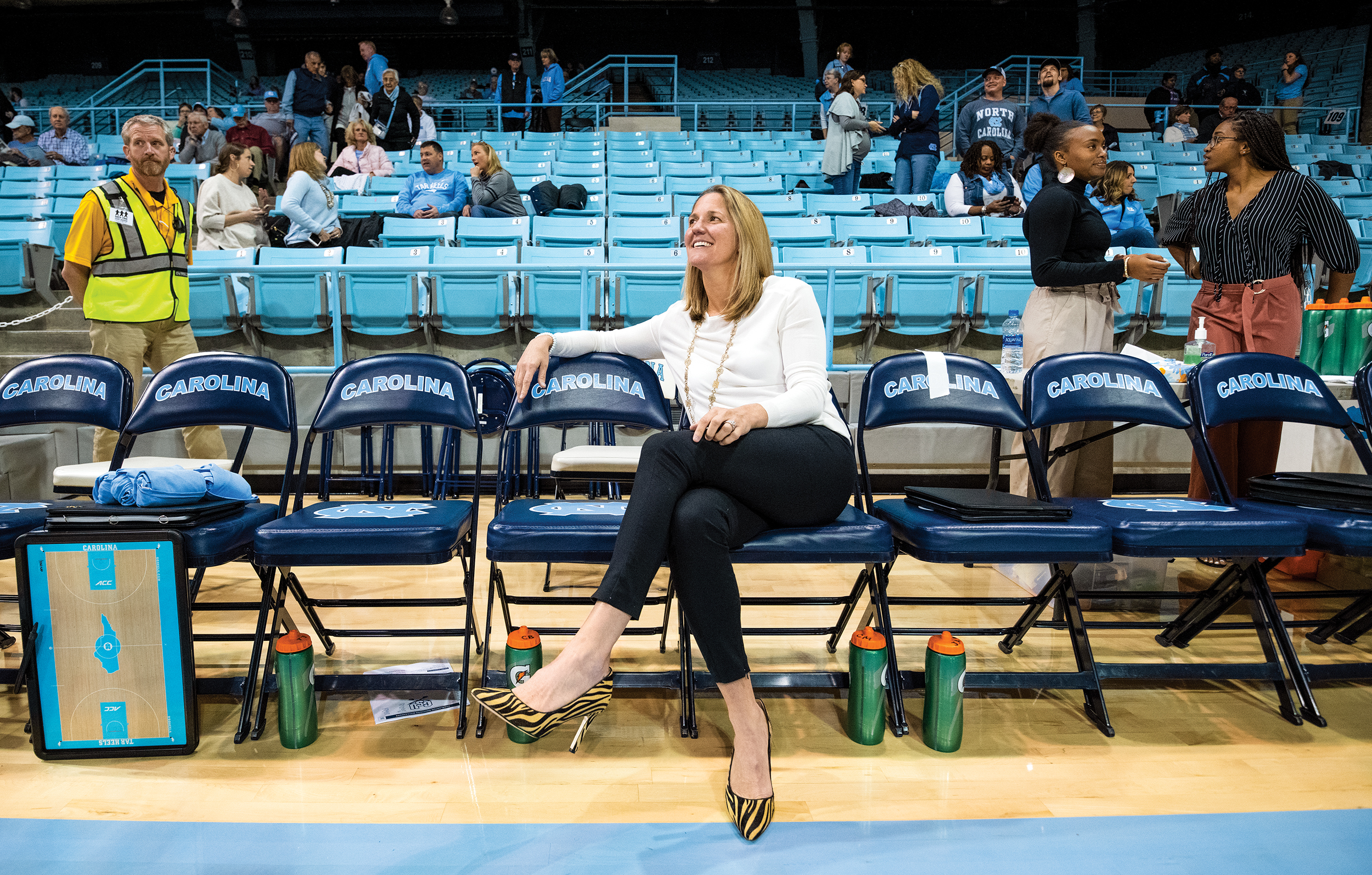
“Coming to UNC is a risk, but I’m not willing to have regrets in life. I like helping people understand the power of going for it.” (Grant Halverson ’93)
Banghart is serious about valuing academics; after her two decades in the Ivy League as a student and a coach, that’s hardly surprising. But her perspective on Carolina is new. UNC’s reputation as a public Ivy hasn’t been knitted tightly enough into the women’s basketball experience, she said. She views that as a weakness for both the player and the program — which has been losing the in-state recruitment war (and the battles on the hard court) to N.C. State for the past five years.
“And we’re a much better school,” Banghart said. “It’s North Carolina. [But] we have turned more people off than on. We’ve got to get the in-state kids, and we will. I’m on it.”
Her plan to turn recruiting around includes supporting life-changing experiences for her athletes — not unlike the Morehead-Cain Scholarship does.
“What are our kids doing in the summer?” said Banghart, who has hired a staff member to focus on just that. “What service projects will be made available? What international study? What internship pipeline? There’s none of that. So, if you’re a recruit, you’re saying, ‘What would I do in the summer? What does this UNC degree get me?’ These are college kids. They should be exploring the world. I could get you a job; I have enough contacts. But I want you to have your passion when you graduate here. And the way you do that is to try things on.
“If you graduate from North Carolina and all you care about is that leather ball,” she said, “we’ve done you a disservice.”
Banghart said she hasn’t dwelled on the problems that brought her here. It’s important, she said, to honor Hatchell’s contributions to Carolina’s legacy and the alumni she coached. But she knows that “there was a little bit of a disconnect. I don’t know where it was. I didn’t look backwards, but either player or coach or both, I don’t know. And we can’t be disconnected. If they have something that’s bothering them, they need to walk in here and say it.”
The new coach says she’s confident that Carolina will bring another national championship home to Carmichael during her tenure. But, first things first.
“There’s some holes we’ve got to clean up here,” she said, including a player culture that needs to focus on gratitude for opportunities given and respect for themselves and each other — philosophies by which Banghart has lived and by which she’s won. “Those things are really important to me. And it’s going to take some time, because it’s a while that these holes have been allowed to operate.
“I’m not going to race a contract just to quick fix this stuff. I’m going to build something that’s going to win — but I’ve got to do it the right way.”
With two of the three Banghart siblings now in Chapel Hill (coincidentally, older sister Jen Tobalski has been a Montessori teacher in the area for 13 years), the roots Courtney is putting down with DeJuliis, their twin sons, Eli and Tucker, and their daughter, Grey, will be even stronger. She signed a four-year contract with UNC in May; but she’s here, she said, to stay.
“I’m not a jumper,” Banghart said. “I was at Princeton for 12 years. It’s this job, and when this job’s done, I’m not coaching anymore. This is it for me.”
After the turmoil of the past decade, was there a better place for Banghart to prove her right way than right here, inside the recovering Carolina Way? Was there a team that needed her energy, intellect and optimism more? It’s now a question for other schools to debate. Because the small-town kid from New Hampshire, the winner and the scholar and the philosopher, has brought her tattered tennis racket and her master’s thesis and her Naismith Trophy to Chapel Hill.
Beth McNichol ’95, a freelance writer based in Raleigh, is a former associate editor for the Review.
Thanks for reading the Carolina Alumni Review
Carolina Alumni members, sign in to continue reading.
Not yet a member? Become one today.
